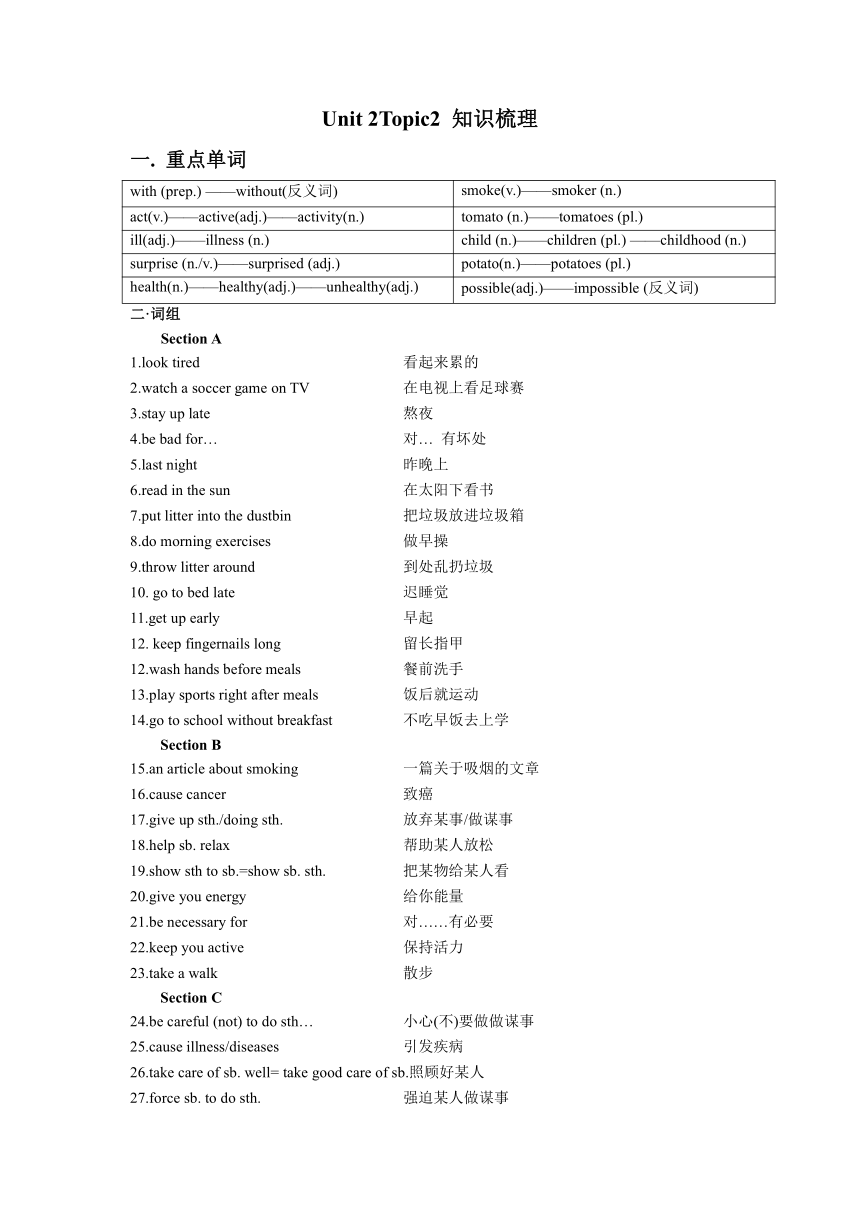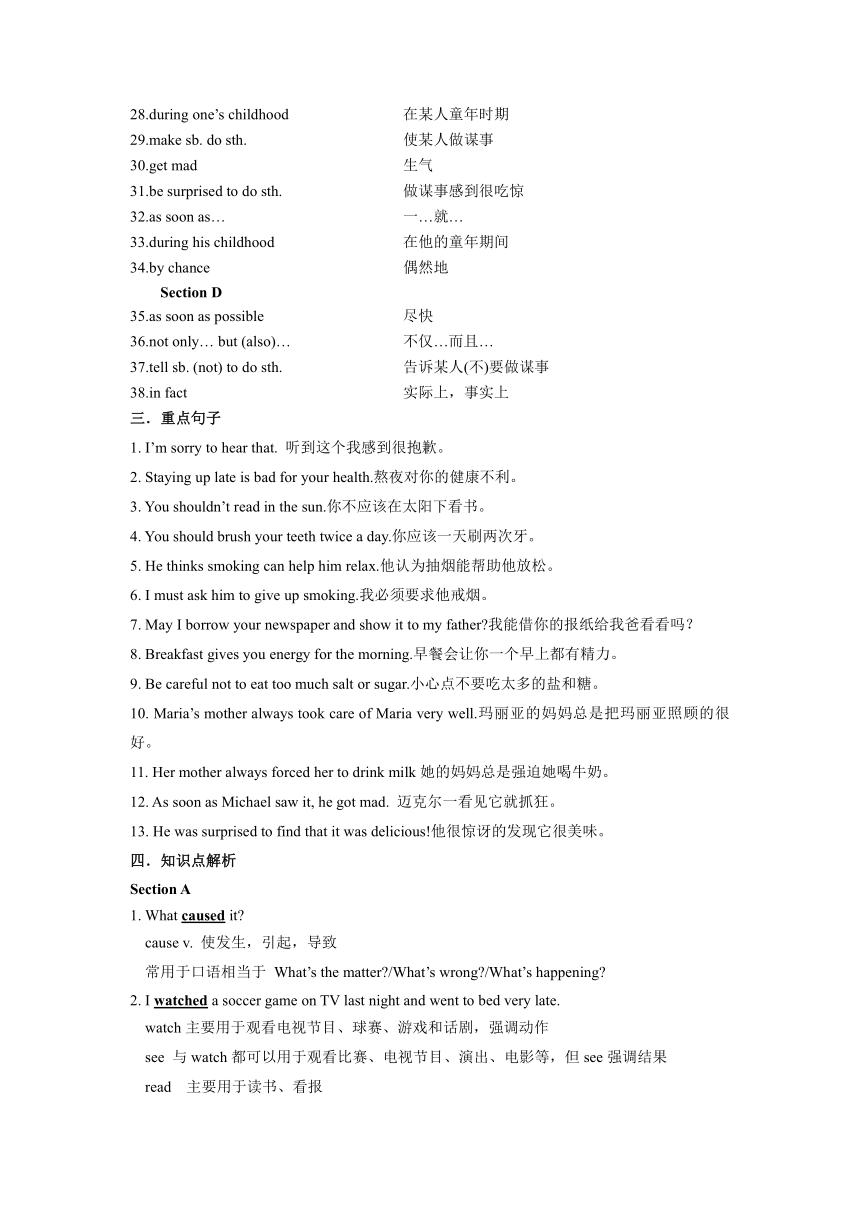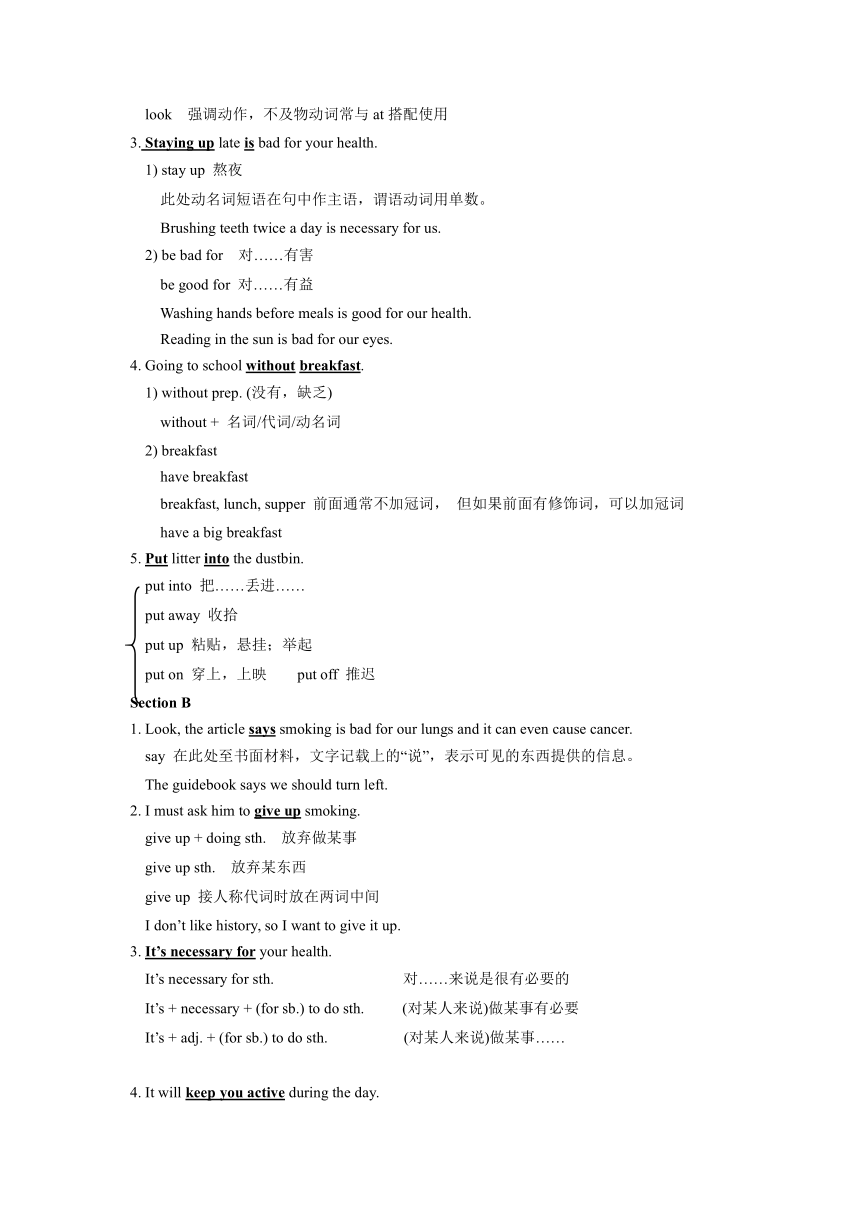仁爱版英语八年级上册 Unit 2 Topic 2 I must ask him to give up smoking. 知识梳理
文档属性
| 名称 | 仁爱版英语八年级上册 Unit 2 Topic 2 I must ask him to give up smoking. 知识梳理 |  | |
| 格式 | docx | ||
| 文件大小 | 32.8KB | ||
| 资源类型 | 教案 | ||
| 版本资源 | 仁爱科普版 | ||
| 科目 | 英语 | ||
| 更新时间 | 2022-08-24 13:51:00 | ||
图片预览



文档简介
Unit 2Topic2 知识梳理
重点单词
with (prep.) ——without(反义词) smoke(v.)——smoker (n.)
act(v.)——active(adj.)——activity(n.) tomato (n.)——tomatoes (pl.)
ill(adj.)——illness (n.) child (n.)——children (pl.) ——childhood (n.)
surprise (n./v.)——surprised (adj.) potato(n.)——potatoes (pl.)
health(n.)——healthy(adj.)——unhealthy(adj.) possible(adj.)——impossible (反义词)
二·词组
Section A
1.look tired 看起来累的
2.watch a soccer game on TV 在电视上看足球赛
3.stay up late 熬夜
4.be bad for… 对… 有坏处
5.last night 昨晚上
6.read in the sun 在太阳下看书
7.put litter into the dustbin 把垃圾放进垃圾箱
8.do morning exercises 做早操
9.throw litter around 到处乱扔垃圾
10. go to bed late 迟睡觉
11.get up early 早起
12. keep fingernails long 留长指甲
12.wash hands before meals 餐前洗手
13.play sports right after meals 饭后就运动
14.go to school without breakfast 不吃早饭去上学
Section B
15.an article about smoking 一篇关于吸烟的文章
16.cause cancer 致癌
17.give up sth./doing sth. 放弃某事/做谋事
18.help sb. relax 帮助某人放松
19.show sth to sb.=show sb. sth. 把某物给某人看
20.give you energy 给你能量
21.be necessary for 对……有必要
22.keep you active 保持活力
23.take a walk 散步
Section C
24.be careful (not) to do sth… 小心(不)要做做谋事
25.cause illness/diseases 引发疾病
26.take care of sb. well= take good care of sb.照顾好某人
27.force sb. to do sth. 强迫某人做谋事
28.during one’s childhood 在某人童年时期
29.make sb. do sth. 使某人做谋事
30.get mad 生气
31.be surprised to do sth. 做谋事感到很吃惊
32.as soon as… 一…就…
33.during his childhood 在他的童年期间
34.by chance 偶然地
Section D
35.as soon as possible 尽快
36.not only… but (also)… 不仅…而且…
37.tell sb. (not) to do sth. 告诉某人(不)要做谋事
38.in fact 实际上,事实上
三.重点句子
1. I’m sorry to hear that. 听到这个我感到很抱歉。
2. Staying up late is bad for your health.熬夜对你的健康不利。
3. You shouldn’t read in the sun.你不应该在太阳下看书。
4. You should brush your teeth twice a day.你应该一天刷两次牙。
5. He thinks smoking can help him relax.他认为抽烟能帮助他放松。
6. I must ask him to give up smoking.我必须要求他戒烟。
7. May I borrow your newspaper and show it to my father 我能借你的报纸给我爸看看吗?
8. Breakfast gives you energy for the morning.早餐会让你一个早上都有精力。
9. Be careful not to eat too much salt or sugar.小心点不要吃太多的盐和糖。
10. Maria’s mother always took care of Maria very well.玛丽亚的妈妈总是把玛丽亚照顾的很好。
11. Her mother always forced her to drink milk她的妈妈总是强迫她喝牛奶。
12. As soon as Michael saw it, he got mad. 迈克尔一看见它就抓狂。
13. He was surprised to find that it was delicious!他很惊讶的发现它很美味。
四.知识点解析
Section A
1. What caused it
cause v. 使发生,引起,导致
常用于口语相当于 What’s the matter /What’s wrong /What’s happening
2. I watched a soccer game on TV last night and went to bed very late.
watch主要用于观看电视节目、球赛、游戏和话剧,强调动作
see 与watch都可以用于观看比赛、电视节目、演出、电影等,但see强调结果
read 主要用于读书、看报
look 强调动作,不及物动词常与at搭配使用
3. Staying up late is bad for your health.
1) stay up 熬夜
此处动名词短语在句中作主语,谓语动词用单数。
Brushing teeth twice a day is necessary for us.
2) be bad for 对……有害
be good for 对……有益
Washing hands before meals is good for our health.
Reading in the sun is bad for our eyes.
4. Going to school without breakfast.
1) without prep. (没有,缺乏)
without + 名词/代词/动名词
2) breakfast
have breakfast
breakfast, lunch, supper 前面通常不加冠词, 但如果前面有修饰词,可以加冠词
have a big breakfast
5. Put litter into the dustbin.
put into 把……丢进……
put away 收拾
put up 粘贴,悬挂;举起
put on 穿上,上映 put off 推迟
Section B
1. Look, the article says smoking is bad for our lungs and it can even cause cancer.
say 在此处至书面材料,文字记载上的“说”,表示可见的东西提供的信息。
The guidebook says we should turn left.
2. I must ask him to give up smoking.
give up + doing sth. 放弃做某事
give up sth. 放弃某东西
give up 接人称代词时放在两词中间
I don’t like history, so I want to give it up.
3. It’s necessary for your health.
It’s necessary for sth. 对……来说是很有必要的
It’s + necessary + (for sb.) to do sth. (对某人来说)做某事有必要
It’s + adj. + (for sb.) to do sth. (对某人来说)做某事……
4. It will keep you active during the day.
keep sb. adj. 使……继续处于某种状态 Please keep the children quite.
sb. doing You kept me waiting for a long time.
Section C
1. Be careful not to eat too much salt or sugar.
or为连词,意为“或者”,用于表示连接选择、替代的词、短语或从句
【拓展】 意为“否则,不然”,用于警告或忠告
Hurry up, or you’ll be late for school.
2. She said it might cause illness.
ill + ness 名词意为“疾病”
ness 常见名词后缀 kindness 仁慈,好意, happiness 幸福
disease 疾病,常指比illness 严重的疾病
3. ..., but her mother always forced her to drink it.
force sb. to do sth. “强迫某人做某事”
4. As soon as Michael saw it, he got mad.
as soon as 意为“一……就”
We will go back to school as soon as the summer holiday is over.
5. But his mother made him taste it.
make sb./sth. + adj 使某人/某物怎么样
make sb./sth. + do sth. 使某人/某物做某事
6. He was surprised to find that it was delicious!
(
“对……感到惊讶”
) be surprised to do sth.
be surprised at sth.
【拓展】 surprise 动词,意为“使吃惊”
surprise 名词,意为“惊讶”
7. Lunch: rice with a lot of meat such as chicken. beef, etc.
such as 例如 后接名词或短语 He knows many languages such as Chinese,English,Russian and French.
for example 例如 后接句子 He is a good boy for example he often helps his mother with the housework.
Section D
1. Smokers shouldn’t use smoking to help them relax.
use sth. to do sth.”用……去做……”
We often use the dictionary to look up the new words.
2. They must give up smoking as soon as possible.
as...as possible 尽量……
Please write down your answer as fast as possible.
五.语法
情态动词(must/mustn’t; may; can/could )
1. can 的用法:
(1) 表示能力时一般译为“能、会”, 即有种能力,尤其是生来具备的能力,此时
may 和must 均不可代替它。
如:She can swim fast, but I can’t . 她能游得很快,但我不能。
I can see with my eyes. 我用眼睛看。
(2) 表示许可,常在口语中。如:You can use my dictionary. 你可以用我的字典。
(3) 表示推测,意为“可能”, 常用于否定句和疑问句中, 此时can’t 译为“ 不可能”。
如:Can the news be true 这个消息会是真的吗?
2. could的用法:
(1) can的过去式,意为“ 能、 会”,表示过去的能力。
如:He could write poems when he was 10. 他十岁时就会写诗。
(2) could在疑问句中,表示委婉的语气,此时 could 没有过去式的意思。
如: --- Could I use your pen 我能用一下你的钢笔吗
--- Yes, you can.可以。(注意回答)
3. may的用法:
(1) 表示请求、许可,比can 正式。
如:May I borrow your bike 我可以借你的自行车吗?
You may go home now. 现在你可以回家了。
(2) 表示推测,谈论可能性,意为“ 可能, 或许”,一般用于肯定句中。
如:It may rain tomorrow . 明天可能会下雨。
She may be at home. 她可能在家呢.
4. must的用法:
(1) must 表示主观看法,意为“必须、一定”。
如:You must stay here until I come back.在我回来之前你必须待在这儿。
Must I hand in my homework right now 我必须现在交作业吗?
(2) 其否定形式mustn’t表示“一定不要”“千万别”“禁止,不许”。
如:You mustn’t play with fire. 你不许玩火。
You mustn’t be late. 你一定不要迟到。
(3) 对must引导的疑问句,肯定回答为must,否定回答为needn’t 或 don’t have to.
如:--- Must I finish my homework now 我现在必须完成作业吗?
--- No, you needn’t.不,你不必。
(4) must表示有把握的推测,用于肯定句。
如: The light is on, so he must be at home now. 灯亮着,他现在肯定在家。
六.书面表达
现在很多同学都有一些不良的饮食习惯,比如不吃早餐就去上学,爱吃垃圾食品(junk food)等等。这些都是极其不好的习惯,对身体有很大危害。请你给这些同学提出一些关于健康饮食的建议。80个词左右。
提示:1.eat more fruit and vegetables;
2. not eat too much salt or sugar;
3. drink enough water;
4...…
【参考范文】
As we all know, we are what we eat. Therefore, it's important for us to have healthy eating habits.
However, some of the students often go to school without breakfast; some like to have snacks or junk food; and some eat too much or too little. All these bad habits are surely bad for our health.
To keep fit, we should eat more fruit and vegetables. Don't eat too much salt or sugar. We must drink enough water every day.Besides,we’d better eat regularly.
In my point, we should develop healthy eating habits. We can keep ourselves healthy and live a happy life in this way.
重点单词
with (prep.) ——without(反义词) smoke(v.)——smoker (n.)
act(v.)——active(adj.)——activity(n.) tomato (n.)——tomatoes (pl.)
ill(adj.)——illness (n.) child (n.)——children (pl.) ——childhood (n.)
surprise (n./v.)——surprised (adj.) potato(n.)——potatoes (pl.)
health(n.)——healthy(adj.)——unhealthy(adj.) possible(adj.)——impossible (反义词)
二·词组
Section A
1.look tired 看起来累的
2.watch a soccer game on TV 在电视上看足球赛
3.stay up late 熬夜
4.be bad for… 对… 有坏处
5.last night 昨晚上
6.read in the sun 在太阳下看书
7.put litter into the dustbin 把垃圾放进垃圾箱
8.do morning exercises 做早操
9.throw litter around 到处乱扔垃圾
10. go to bed late 迟睡觉
11.get up early 早起
12. keep fingernails long 留长指甲
12.wash hands before meals 餐前洗手
13.play sports right after meals 饭后就运动
14.go to school without breakfast 不吃早饭去上学
Section B
15.an article about smoking 一篇关于吸烟的文章
16.cause cancer 致癌
17.give up sth./doing sth. 放弃某事/做谋事
18.help sb. relax 帮助某人放松
19.show sth to sb.=show sb. sth. 把某物给某人看
20.give you energy 给你能量
21.be necessary for 对……有必要
22.keep you active 保持活力
23.take a walk 散步
Section C
24.be careful (not) to do sth… 小心(不)要做做谋事
25.cause illness/diseases 引发疾病
26.take care of sb. well= take good care of sb.照顾好某人
27.force sb. to do sth. 强迫某人做谋事
28.during one’s childhood 在某人童年时期
29.make sb. do sth. 使某人做谋事
30.get mad 生气
31.be surprised to do sth. 做谋事感到很吃惊
32.as soon as… 一…就…
33.during his childhood 在他的童年期间
34.by chance 偶然地
Section D
35.as soon as possible 尽快
36.not only… but (also)… 不仅…而且…
37.tell sb. (not) to do sth. 告诉某人(不)要做谋事
38.in fact 实际上,事实上
三.重点句子
1. I’m sorry to hear that. 听到这个我感到很抱歉。
2. Staying up late is bad for your health.熬夜对你的健康不利。
3. You shouldn’t read in the sun.你不应该在太阳下看书。
4. You should brush your teeth twice a day.你应该一天刷两次牙。
5. He thinks smoking can help him relax.他认为抽烟能帮助他放松。
6. I must ask him to give up smoking.我必须要求他戒烟。
7. May I borrow your newspaper and show it to my father 我能借你的报纸给我爸看看吗?
8. Breakfast gives you energy for the morning.早餐会让你一个早上都有精力。
9. Be careful not to eat too much salt or sugar.小心点不要吃太多的盐和糖。
10. Maria’s mother always took care of Maria very well.玛丽亚的妈妈总是把玛丽亚照顾的很好。
11. Her mother always forced her to drink milk她的妈妈总是强迫她喝牛奶。
12. As soon as Michael saw it, he got mad. 迈克尔一看见它就抓狂。
13. He was surprised to find that it was delicious!他很惊讶的发现它很美味。
四.知识点解析
Section A
1. What caused it
cause v. 使发生,引起,导致
常用于口语相当于 What’s the matter /What’s wrong /What’s happening
2. I watched a soccer game on TV last night and went to bed very late.
watch主要用于观看电视节目、球赛、游戏和话剧,强调动作
see 与watch都可以用于观看比赛、电视节目、演出、电影等,但see强调结果
read 主要用于读书、看报
look 强调动作,不及物动词常与at搭配使用
3. Staying up late is bad for your health.
1) stay up 熬夜
此处动名词短语在句中作主语,谓语动词用单数。
Brushing teeth twice a day is necessary for us.
2) be bad for 对……有害
be good for 对……有益
Washing hands before meals is good for our health.
Reading in the sun is bad for our eyes.
4. Going to school without breakfast.
1) without prep. (没有,缺乏)
without + 名词/代词/动名词
2) breakfast
have breakfast
breakfast, lunch, supper 前面通常不加冠词, 但如果前面有修饰词,可以加冠词
have a big breakfast
5. Put litter into the dustbin.
put into 把……丢进……
put away 收拾
put up 粘贴,悬挂;举起
put on 穿上,上映 put off 推迟
Section B
1. Look, the article says smoking is bad for our lungs and it can even cause cancer.
say 在此处至书面材料,文字记载上的“说”,表示可见的东西提供的信息。
The guidebook says we should turn left.
2. I must ask him to give up smoking.
give up + doing sth. 放弃做某事
give up sth. 放弃某东西
give up 接人称代词时放在两词中间
I don’t like history, so I want to give it up.
3. It’s necessary for your health.
It’s necessary for sth. 对……来说是很有必要的
It’s + necessary + (for sb.) to do sth. (对某人来说)做某事有必要
It’s + adj. + (for sb.) to do sth. (对某人来说)做某事……
4. It will keep you active during the day.
keep sb. adj. 使……继续处于某种状态 Please keep the children quite.
sb. doing You kept me waiting for a long time.
Section C
1. Be careful not to eat too much salt or sugar.
or为连词,意为“或者”,用于表示连接选择、替代的词、短语或从句
【拓展】 意为“否则,不然”,用于警告或忠告
Hurry up, or you’ll be late for school.
2. She said it might cause illness.
ill + ness 名词意为“疾病”
ness 常见名词后缀 kindness 仁慈,好意, happiness 幸福
disease 疾病,常指比illness 严重的疾病
3. ..., but her mother always forced her to drink it.
force sb. to do sth. “强迫某人做某事”
4. As soon as Michael saw it, he got mad.
as soon as 意为“一……就”
We will go back to school as soon as the summer holiday is over.
5. But his mother made him taste it.
make sb./sth. + adj 使某人/某物怎么样
make sb./sth. + do sth. 使某人/某物做某事
6. He was surprised to find that it was delicious!
(
“对……感到惊讶”
) be surprised to do sth.
be surprised at sth.
【拓展】 surprise 动词,意为“使吃惊”
surprise 名词,意为“惊讶”
7. Lunch: rice with a lot of meat such as chicken. beef, etc.
such as 例如 后接名词或短语 He knows many languages such as Chinese,English,Russian and French.
for example 例如 后接句子 He is a good boy for example he often helps his mother with the housework.
Section D
1. Smokers shouldn’t use smoking to help them relax.
use sth. to do sth.”用……去做……”
We often use the dictionary to look up the new words.
2. They must give up smoking as soon as possible.
as...as possible 尽量……
Please write down your answer as fast as possible.
五.语法
情态动词(must/mustn’t; may; can/could )
1. can 的用法:
(1) 表示能力时一般译为“能、会”, 即有种能力,尤其是生来具备的能力,此时
may 和must 均不可代替它。
如:She can swim fast, but I can’t . 她能游得很快,但我不能。
I can see with my eyes. 我用眼睛看。
(2) 表示许可,常在口语中。如:You can use my dictionary. 你可以用我的字典。
(3) 表示推测,意为“可能”, 常用于否定句和疑问句中, 此时can’t 译为“ 不可能”。
如:Can the news be true 这个消息会是真的吗?
2. could的用法:
(1) can的过去式,意为“ 能、 会”,表示过去的能力。
如:He could write poems when he was 10. 他十岁时就会写诗。
(2) could在疑问句中,表示委婉的语气,此时 could 没有过去式的意思。
如: --- Could I use your pen 我能用一下你的钢笔吗
--- Yes, you can.可以。(注意回答)
3. may的用法:
(1) 表示请求、许可,比can 正式。
如:May I borrow your bike 我可以借你的自行车吗?
You may go home now. 现在你可以回家了。
(2) 表示推测,谈论可能性,意为“ 可能, 或许”,一般用于肯定句中。
如:It may rain tomorrow . 明天可能会下雨。
She may be at home. 她可能在家呢.
4. must的用法:
(1) must 表示主观看法,意为“必须、一定”。
如:You must stay here until I come back.在我回来之前你必须待在这儿。
Must I hand in my homework right now 我必须现在交作业吗?
(2) 其否定形式mustn’t表示“一定不要”“千万别”“禁止,不许”。
如:You mustn’t play with fire. 你不许玩火。
You mustn’t be late. 你一定不要迟到。
(3) 对must引导的疑问句,肯定回答为must,否定回答为needn’t 或 don’t have to.
如:--- Must I finish my homework now 我现在必须完成作业吗?
--- No, you needn’t.不,你不必。
(4) must表示有把握的推测,用于肯定句。
如: The light is on, so he must be at home now. 灯亮着,他现在肯定在家。
六.书面表达
现在很多同学都有一些不良的饮食习惯,比如不吃早餐就去上学,爱吃垃圾食品(junk food)等等。这些都是极其不好的习惯,对身体有很大危害。请你给这些同学提出一些关于健康饮食的建议。80个词左右。
提示:1.eat more fruit and vegetables;
2. not eat too much salt or sugar;
3. drink enough water;
4...…
【参考范文】
As we all know, we are what we eat. Therefore, it's important for us to have healthy eating habits.
However, some of the students often go to school without breakfast; some like to have snacks or junk food; and some eat too much or too little. All these bad habits are surely bad for our health.
To keep fit, we should eat more fruit and vegetables. Don't eat too much salt or sugar. We must drink enough water every day.Besides,we’d better eat regularly.
In my point, we should develop healthy eating habits. We can keep ourselves healthy and live a happy life in this way.
同课章节目录
- Unit 1 Playing Sports
- Topic 1 I'm going to play basketball.
- Topic 2 I'll kick you the ball again.
- Topic 3 The school sports meet is coming.
- Unit 2 Keeping Healthy
- Topic 1 You should brush your teeth twice a day.
- Topic 2 I must ask him to give up smoking.
- Topic 3 Must we exercise to prevent the flu?
- Unit 3 Our Hobbies
- Topic 1 What's your hobby?
- Topic 2 What sweet music!
- Topic 3 What were you doing at this time yesterday
- Unit 4 Our World
- Topic 1 What's the strongest animal on the farm?
- Topic 2 How can we protect ourselves from the eart
- Topic 3 The Internet makes the world smaller.
